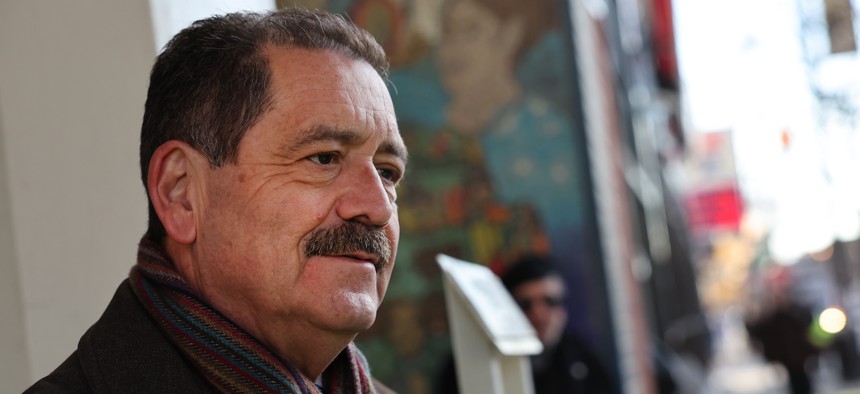House Democrats say they’re still concerned with CBP One

Rep. Jesus 'Chuy' Garcia, D-Ill., on the campaign trail during his bid for the Chicago mayoralty in 2023. Garcia wants CBP to change a policy requiring most asylum-seekers to use the agency's CBP-One app to schedule appointments. Scott Olson/Getty Images
The app is part of the administration’s push to encourage migrants to use legal pathways to enter the U.S.
In March 2023, over 30 House Democrats expressed their concerns about the use of a Customs and Border Protection app at the southwestern border, called CBP One.
A year later, many say that their concerns about equity and access remain, per a new letter penned to Homeland Security Secretary Alejandro Mayorkas asking the department “to take immediate steps to both improve CBP One and resolve accessibility issues.”
The group of 30 House Democrats — co-led by Reps. Raúl Grijalva, D-Ariz., Jesús “Chuy” García, D-Ill., and Joaquin Castro, D-Texas — say that they’re primarily concerned with the department’s push for CBPOne to be used at the border to schedule appointments at ports of entry.
Migrants hoping to enter the country without prior authorization are strongly encouraged to use the app and presumed ineligible for asylum if they don’t use it or a different legal pathway, as Nextgov/FCW recently reported. To use the app, migrants have to be located in central or northern Mexico.
The administration says the use of CBP One has cut down on smugglers and is an example of efforts to encourage the use of legal pathways.
The lawmakers, meanwhile, say that “CBP’s decision to require asylum seekers to use the still-faulty CBP One app fundamentally undermines the accessibility of the asylum process… The current process obstructs the right to seek asylum by forcing individuals to remain in Mexico while waiting for their asylum cases to be heard.”
The lawmakers say that the wait for migrants in Mexico can be unsafe and prolonged.
They also have remaining concerns about the app itself, particularly in terms of language access. Lawmakers write that the app is only available in English, Spanish and Haitian Creole. And even for those that do speak those languages, “the app can be difficult to understand,” they argue, calling the translations poor quality.
“Individuals who cannot use CBP One due to language barriers, technical failures, or other obstacles and present at a port of entry must demonstrate to often-skeptical CBP officials that it was not possible to apply through the app,” the letter continues, noting that exceptions to the use of the app “appear neither meaningful not accessible.”
The authors of the letter want DHS and CBP to include more languages in the app and improve the quality of the translations; make the app more understandable and accessible for people with low levels of literacy; and provide clearer troubleshooting channels for those that encounter problems.
They also want changes to the DHS rule that makes those that don’t use the app presumed ineligible for asylum, calling for more appointment slots and a response from DHS with data by April 15.
The letter falls on the same day as a House Homeland Security hearing focused solely on CBP One. House Republicans on the committee also appear to be displeased with the app, albeit for different reasons, calling it a “mass-parole scheme” and tying it to their February impeachment of Mayorkas.



